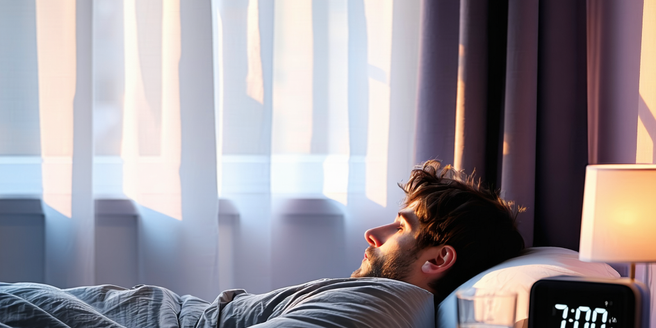
Understanding Sleep Cycles
| Stage | Duration | Characteristics |
| NREM Stage 1 | 1-7 minutes | Light sleep, muscle activity slows |
| NREM Stage 2 | 10-25 minutes | Breathing pattern and heart rate slow |
| NREM Stage 3 | 20-40 minutes | Deep sleep begins, difficult to wake |
| Stage 4 (REM) | 10-60 minutes | Dreaming occurs, muscles relax |
| Sleep Cycle | 90-110 minutes | Repeats multiple times per night |
The Impact of Sleep on Health
Sleep plays a vital role in good health and well-being. Getting adequate sleep boosts brain function, mood, and overall physical health. It supports various bodily functions, including memory consolidation and the repair of cells and tissues. Moreover, quality sleep can improve mental resilience and emotional regulation. A consistent sleep schedule is essential for maximizing these benefits. When sleep is insufficient, it can lead to increased stress levels, weight gain, and affect hormone balance. A regular and deep sleep pattern enhances immune system efficiency, thereby reducing the risk of chronic illnesses such as heart disease and diabetes. Therefore, prioritizing sleep as part of a healthy lifestyle is crucial for maintaining health and productivity.
Benefits of a Consistent Sleep Schedule
Maintaining a consistent sleep schedule offers myriad benefits for both physical and mental health. When the body tunes into a regular circadian rhythm, it helps regulate sleeping patterns, making falling asleep and waking up easier. A consistent schedule helps lower stress levels and enhances cognitive functions such as decision-making, learning, and creativity. Prioritizing sleep health can lay the foundation for improved overall well-being. Over time, this routine can even contribute to better emotional regulation and resilience. In today’s fast-paced world, dedicating time to sleep can be a vital aspect of self-care. Additionally, it aids digestion and metabolism, contributing to a healthier weight. Adhering to a regular bedtime also enforces discipline and improves mood stability, proving the long-term advantages of consistent sleep.
How Sleep Affects Mental Well-being
Quality sleep is intimately connected to mental well-being. When sleep is optimally achieved, the mind is able to process emotions and experiences more effectively, leading to improved mood regulation and enhanced emotional resilience. A consistent sleep schedule can help establish a natural rhythm that supports better sleep quality. Getting enough rest allows the brain to recharge and function at its best. Conversely, lack of sleep is associated with increased irritability, mood swings, and vulnerability to stress. Prioritizing sleep hygiene practices can significantly impact overall mental health. In the long run, insufficient or poor-quality sleep can exacerbate mental health issues like anxiety, depression, and can affect cognitive processes such as memory and concentration. Therefore, ensuring adequate sleep is integral for mental health maintenance.
Common Sleep Disruptors
Numerous factors can disrupt sleep, impacting both quality and duration. Stress and anxiety are leading contributors to sleep disturbances, making relaxation techniques vital before bedtime. Environmental noise, light, and uncomfortable room temperatures can also prevent restful sleep. Ensuring your sleeping environment is conducive to rest can make a significant difference. It may be helpful to establish a calming bedtime routine to further enhance sleep quality. Engaging in regular physical activity during the day can also promote better sleep. Lifestyle habits such as caffeine and alcohol consumption too close to bedtime disrupt sleep cycles. Furthermore, erratic work schedules and the use of electronic devices before bed interfere with melatonin production. Identifying and mitigating these factors is crucial for achieving rejuvenating sleep.
Creating a Relaxing Sleep Environment
Designing a tranquil sleep environment is fundamental for promoting restful sleep. Begin by investing in a comfortable mattress and pillows. Optimize the bedroom environment by controlling light exposure with blackout curtains and minimizing noise with white noise machines or earplugs. Adding soft, warm lighting can further enhance the room’s serene ambiance. Incorporating plants that purify the air can also contribute to a healthier sleep space. Maintaining a cooler room temperature is conducive to sleep. Consider using natural materials for bedding to increase comfort. Incorporate calming scents, such as lavender, into the space. Declutter the area to generate a calming atmosphere. Lastly, reserve the bedroom for sleep and relaxation only, excluding work-related items to ensure the mind associates it with rest.
Tips for Establishing a Bedtime Routine
Creating a consistent bedtime routine signals the body that it’s time to unwind. Start by setting a fixed bedtime and wake-up time, even on weekends. It’s also beneficial to create a comfortable sleep environment with a cool, dark, and quiet room. Consider using blackout curtains or a white noise machine to enhance the sleep environment. Aim for a supportive mattress and pillows to enhance comfort. Engage in relaxing pre-sleep activities like reading, meditation, or a warm bath. Avoid electronics at least an hour before bed to reduce blue light exposure that interferes with melatonin production. Limit heavy meals and caffeine in the evening. Incorporate mindfulness or journaling as part of the routine to clear the mind, reducing anxiety and promoting a peaceful transition to sleep.
Role of Nutrition in Sleep Quality
Nutrition significantly influences sleep quality. Consuming balanced diets rich in fruits, vegetables, and lean proteins promotes better sleep. Specific nutrients like magnesium and tryptophan found in foods such as nuts, seeds, and turkey aid in sleep. Incorporating whole grains into your meals can also provide sustained energy levels throughout the night. Additionally, establishing a consistent eating schedule can further enhance sleep patterns. Hydration is also essential, as dehydration can lead to restless nights. Limiting sugar and refined carbohydrates helps maintain stable blood sugar levels, reducing nighttime wakefulness. Be mindful of caffeine and alcohol consumption, as they disturb sleep cycles. A light snack before bed, like a banana or yogurt, may help if you’re hungry, preventing discomfort-induced wakefulness.
Technology’s Effect on Sleep Patterns
The prevalence of technology disrupts natural sleep patterns. Exposure to blue light from screens inhibits melatonin production, impairing the ability to fall asleep. Social media and video games stimulate the mind, delaying sleep onset. Many people use smartphones and tablets in bed, reducing sleep quality. This reliance on technology can create a cycle of poor sleep, affecting overall well-being. Studies have shown that decreased melatonin levels lead to a disrupted circadian rhythm. It’s crucial to recognize the impact of technology on our sleep health. Set boundaries for device use before bed and utilize blue light filters or ‘night mode’ settings to alleviate effects. Designate tech-free periods during the evening to assist in naturally winding down, promoting healthier sleeping patterns.
Overcoming Sleep Challenges
Overcoming sleep challenges requires identifying underlying issues and implementing targeted strategies. For sleep-onset problems, establish consistent sleep schedules and incorporate relaxation techniques. It might also be beneficial to limit screen time before bed to promote better sleep hygiene. Creating an optimal sleep environment can dramatically enhance the quality of rest. Address sleep maintenance difficulties by curbing nighttime disruptions, like environment adjustments or minimizing fluid intake before bed. Remember, small tweaks can make a big difference in your sleep quality. For chronic issues, consult healthcare providers for solutions like cognitive behavioral therapy for insomnia. Sometimes lifestyle changes, such as exercise or stress management practices, significantly improve overall sleep quality, assisting in overcoming persistent sleep challenges.

